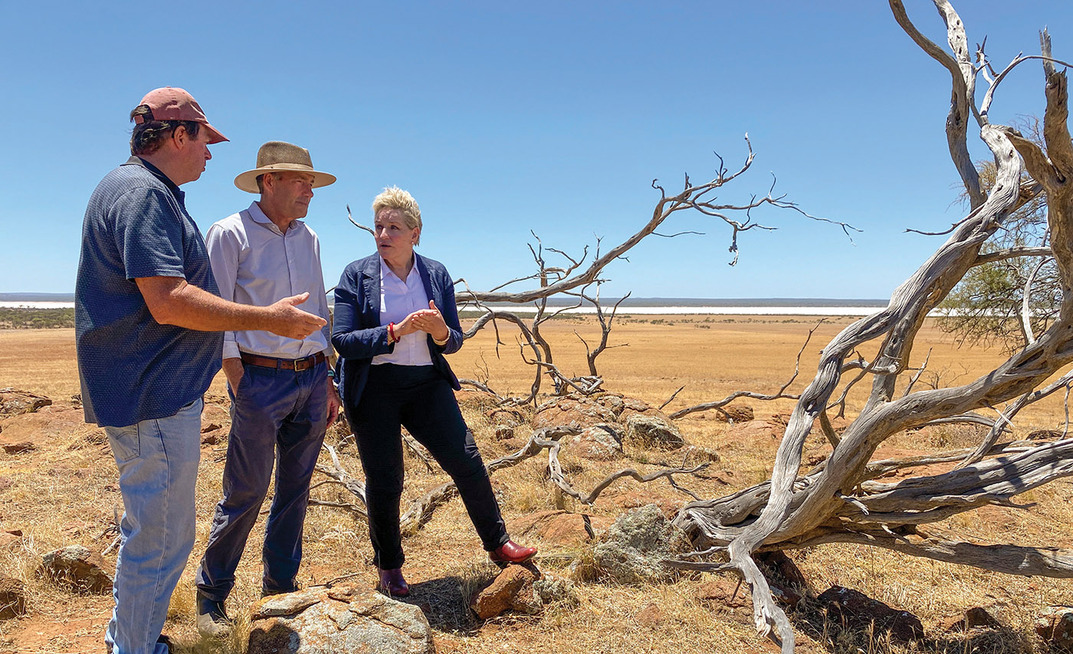As a key initiative of Western Australia's State Climate Policy, the Department of Primary Industries and Regional Development (DPIRD) is working with landholders via its Carbon Farming and Land Restoration Program to develop innovative carbon farming projects within the south west agricultural region.
With producers, consultants and researchers navigating carbon calculators and abatement, and the State's goal of Net Zero status by 2030, there are simultaneous opportunities presented by carbon farming (a verified increase in long term carbon stocks) and participation in the growing carbon market.
Carbon farming projects that use soil or vegetation methodologies and combinations of known and emerging carbon sequestering farming systems will soon become part of the agricultural landscape.
For some enterprise types, verified offsets may be required to achieve carbon neutral status, after the carbon footprint of a business has been calculated and reduced as much as feasible with current technologies and available farm inputs.
Rather than having to purchase a carbon credit to offset emissions, most primary production enterprises can produce Australian Carbon Credit Units (ACCUs) issued by the Clean Energy Regulator (CER) through the Emissions Reduction Fund (ERF).
When the opportunities and co-benefits are considered, engagement with carbon farming is worthy of the time and financial investment.
Increasing carbon stocks builds business resilience by providing a potential alternative income stream and verified offsets for Net Zero status. Co-benefits, such as increased agricultural productivity, improved soil health and salinity mitigation, add value to the carbon and improve sustainability. Furthermore, biodiversity co-benefits will soon provide another tradeable credit via biodiversity stewardship agreements with the Agriculture Biodiversity Stewardship Package.
To participate in the ERF, a project must be registered before the new carbon sequestration activity begins to accurately measure change in carbon stocks.
The first audit period is three to five years after baseline measurements, so given the time needed from registering a carbon farming project to the first ACCU issuance, the time to start planning is now!
The successful applicants from Round One of the Carbon Farming and Land Restoration Program were recently announced. The ACCU-Plus scheme provides up-front funding in exchange for future ACCUs, while the Future Carbon scheme provides for projects that conduct research to develop new carbon sequestration methods.
Examples of successful Round One ACCU-Plus project activities included:
- Revegetation of low productivity land that simultaneously provides landscape connectivity plus associated biodiversity and salinity management co-benefits.
- Soil amelioration, including changes to grazing intensity, the addition of trace elements and liquid calcium, alongside productivity co-benefits such as building resilience of crops to frost and disease from resulting soil biology functions, plus increased water holding capacity and reduced water runoff after rainfall.
- Re-establishment and restoration of pasture composition combining annual and deep-rooted perennial grasses and legumes. The co-benefits include improved productivity due to soil microbial and fungal activity including reduced wind erosion and resilience of soils to extended periods of dry or wet conditions.
Round One Future Carbon project activities included:
- Using living plant systems and modern farming methods to sequester soil carbon, reduce greenhouse gas emissions and improve soil fertility including crop sequencing and application of new technologies.
- Building soil health with pasture biodiversity management.
- Assessing the potential of saltbush to sequester carbon in the South West.
- Determining the viability of converting green waste and compostable municipal solid waste to biochar to benefit local agicultural production.
Round Two of the Carbon Farming and Land Restoration Program will open in coming months.
A series of workshops will be held early in the year to help agricultural producers to become involved in carbon farming. Topics include project planning and methodology, navigating the CER/ERF registration process, working with carbon service providers and consultants, and business planning considerations for maintaining long-term carbon sequestering activities.
For more information visit WA Carbon Farming and Land Restoration Program. To register your interest, click on the subscription link on the webpage or email CarbonFarming@dpird.wa.gov.au
ABOUT THIS COMPANY
DPIRD WA
DPIRD working with landholders & Land Restoration Program to develop innovative carbon farming projects within south west agricultural region.
HEAD OFFICE:
- 3 Baron-Hay Crt, South Perth, WA, 6151, Australia
- Phone: 893634129
- Website: www.agric.wa.gov.au
- Email: carbonFarming@dpird.wa.gov.au
























